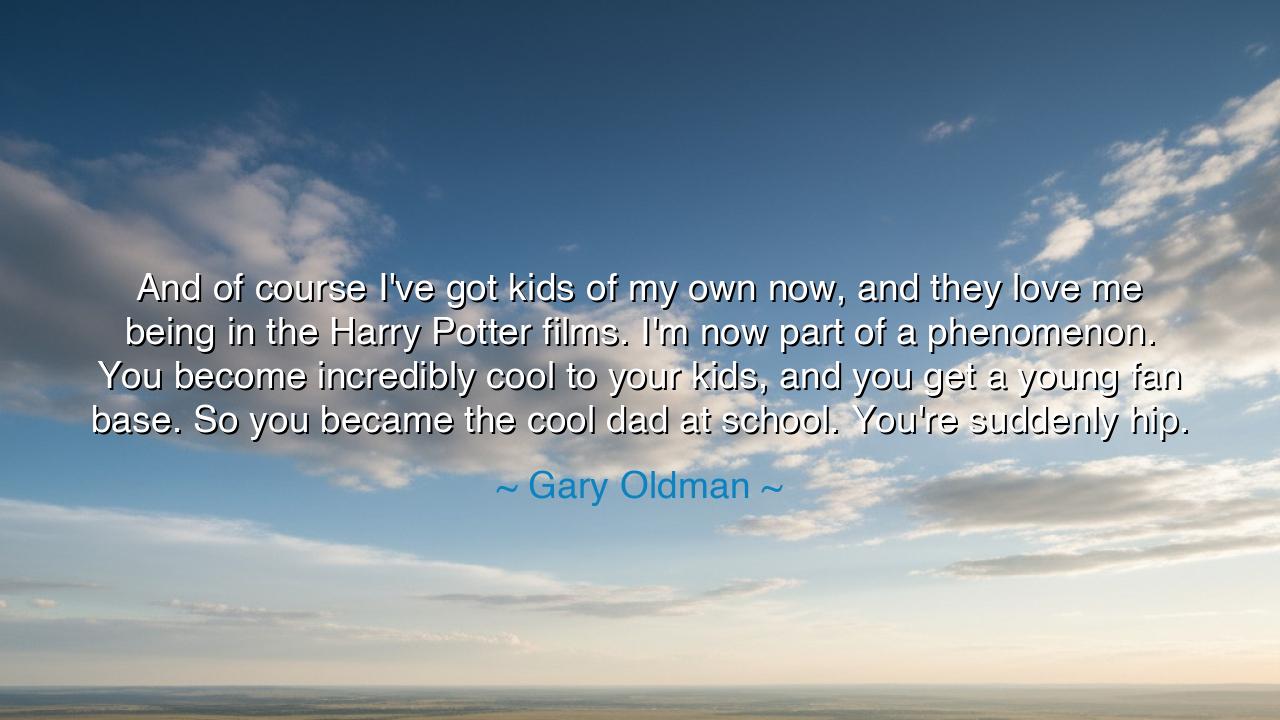
And of course I've got kids of my own now, and they love me being
And of course I've got kids of my own now, and they love me being in the Harry Potter films. I'm now part of a phenomenon. You become incredibly cool to your kids, and you get a young fan base. So you became the cool dad at school. You're suddenly hip.






In the grand arc of life, there are few joys more profound than the moment when a parent becomes not only a guide but also a hero in the eyes of their children. Gary Oldman’s words, "And of course I've got kids of my own now, and they love me being in the Harry Potter films. I'm now part of a phenomenon. You become incredibly cool to your kids, and you get a young fan base. So you became the cool dad at school. You're suddenly hip," reflect the transformation of a parent’s role as seen through the lens of popular culture. In this moment, Oldman captures the essence of the dual power of parenthood and celebrity—a combination that makes one not only a figure of respect but also a symbol of excitement and adventure to the younger generation.
In the ancient world, the relationship between parents and children was seen as one of deep responsibility and honor. Yet, there were times when a parent’s fame or legacy could elevate their status in the eyes of their children and society. The great Achilles, whose father was the mighty Peleus, was not just a warrior but also a mythic figure whose name and deeds were revered throughout Greece. His children, though they did not live to witness his full triumphs, would forever carry the weight of his name, and his legacy would become an idealized model for them. In the same way, Oldman’s children, seeing their father as part of the Harry Potter phenomenon, would have a unique perspective on their father’s life and work. To them, his role in those films is not just a job but an emblem of coolness, a piece of magic that connects them to something larger than themselves.
The shift in Oldman’s perception—from a respected actor to a cool dad—mirrors an ancient truth: greatness is often passed down not just through the deeds of a parent, but through the stories and symbols they become part of. The Romans understood this well. Julius Caesar, for instance, became not only a ruler but a symbol of Roman power and ambition. His family’s name, the Julii, was associated with strength, leadership, and military might. In much the same way, Oldman’s role in a widely beloved franchise has linked him to the hearts and imaginations of a generation, transforming him from an actor to a living myth in the eyes of his children.
Fame, in this regard, holds a dual nature. While it can create distance, fostering admiration from a distance, it also has the power to bridge generational gaps and bring parents closer to their children. Oldman’s experience with his children loving his role in the Harry Potter films reflects this ability of art and culture to connect people across age and time. In ancient cultures, this connection was often forged in public storytelling and art. Bards would weave the deeds of heroes into tales that were passed down through the generations, and a parent’s connection to those stories created a shared experience between them and their children. Oldman’s role in the films echoes this timeless tradition—he is not only a father but also a figure who bridges the realms of the ordinary and the legendary, becoming part of the shared myth of his family’s life.
Moreover, this newfound coolness in the eyes of his children is not solely derived from his fame, but from the joy and love that it brings. It reflects the idea that in the eyes of a child, a parent becomes the embodiment of all that is good, brave, and wonderful. Even in ancient times, the bond between parent and child was seen as sacred, and it was through this bond that the future generations carried forward the wisdom of their ancestors. In the same way, Oldman’s transformation into a hero for his children is a reminder that greatness is often not just a matter of achieving external success, but of how love, creativity, and connection imbue our actions with meaning that transcends time.
The lesson here is one of presence and connection. While we may not all have the privilege of being part of a global cultural phenomenon like Harry Potter, we can still strive to create a lasting legacy with our children through our actions, our passions, and the stories we share. Oldman’s words remind us that the essence of fatherhood, or indeed parenthood in general, is not just about authority or discipline but about sharing a sense of wonder and adventure with the younger generation. Even if the magic of a film franchise does not touch us, we can still share the magic of life, and in doing so, become “cool” in the eyes of our children, not through fame, but through love, connection, and shared experiences.
In practical terms, we should seek to foster meaningful relationships with those we care for, particularly the younger generation, by being actively engaged in their lives, sharing in their joys, and finding common ground through shared experiences. Like Oldman, we may not know what forms of magic will emerge, but by engaging fully with those around us, we create a legacy of connection and love that transcends the fleeting nature of time and transforms us into heroes in the eyes of those we cherish most.






AAdministratorAdministrator
Welcome, honored guests. Please leave a comment, we will respond soon